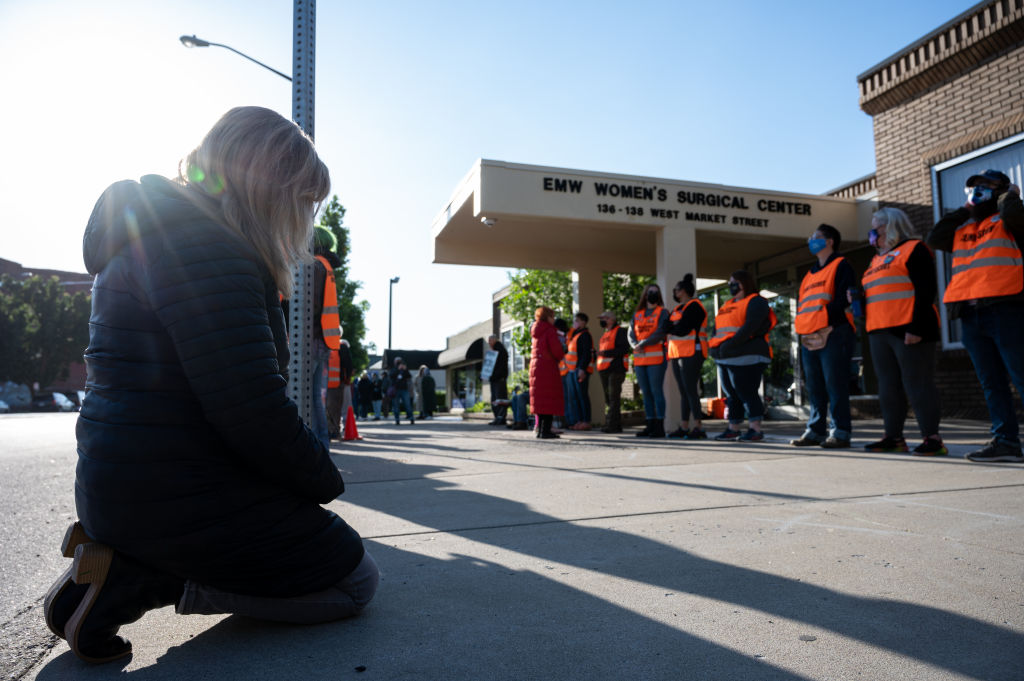A federal judge refused last week to intervene in the institution of a buffer zone outside of a Kentucky abortion facility, ruling that the pro-lifers who sued to prevent the buffer zone misinterpreted its extent and scope as extending half a city block when in fact it would extend 10 feet across the sidewalk entrance to the facility.
District Judge Rebecca Grady Jennings wrote, “Plaintiffs would still be able to engage in sidewalk counseling outside of EMW due to the large stretches of sidewalk out front of EMW that will remain outside the buffer zone’s boundaries.” Jennings’ ruling further granted the pro-lifers an opportunity to restate their case seeking to stop the creation of the buffer zone on the grounds that buffer zones violate pro-lifers’ constitutional right to free speech on public sidewalks.
According to the Courier Journal, the ruling stated that the plaintiffs, Kentucky Right to Life and Sisters for Life, “must be given a reasonable opportunity to present material detailing what the practical effects of the 10-foot buffer zone would be on their sidewalk counseling efforts.” Moving forward, both sides will present evidence regarding the real-life impact the buffer zone will have on sidewalk counseling as well as the city’s process of using less restrictive means to ensure the health and safety of women seeking abortions at the facility.
READ: Pro-life group buys parking lot across from abortion clinic amid threat of buffer zone
In June of this year, Live Action News reported that Kentucky Right to Life and the Sisters for Life were suing the Louisville Metro Mayor and Police Chief as well as the Jefferson County Attorney over the planned erection of a buffer zone outside the state’s only operating abortion facility, EMW Women’s Surgical Center in Louisville. At that time, KRTL and SFL believed the buffer zone would extend half a city block, effectively banning all sidewalk counseling of abortion-minded patients. The lawsuit sought both a temporary restraining order and a preliminary injunction preventing the creation of the buffer zone while its constitutionality was decided. Notably, a similar buffer zone ordinance in Louisville was voted down 13-12 just one year ago, before the election of two new Metro council members willing to revive it. In late April of 2021, the ordinance passed in a 14-11 vote.
Previous legal precedent has found buffer zones to be unconstitutional because they violate pro-lifers’ freedom of speech rights. Furthermore, buffer zone laws are consistently used to target pro-lifers, and pro-lifers only, allegedly preventing the “harassment” of abortion facility patients. In 2014, the Supreme Court struck down a Massachusetts buffer zone law. Multiple other states have active litigation regarding buffer zones, including Ohio and Pennsylvania.
The Louisville, Kentucky, abortion facility at the center of this most recent buffer zone debate, EMW Women’s Surgical Center, has long been embroiled in controversy. As long ago as 2010, a Live Action undercover investigation caught staff there failing to report the possible sexual abuse of a minor. And in 2017, an EMW affiliate was shut down for operating in squalid conditions and without a license. The Louisville location has itself been found with improperly stored narcotics and an emergency resuscitation cart stocked with expired medicine, as documented by CheckMyClinic.
EMW Women’s Surgical Center’s co-owner is also a long-time professor at the University of Kentucky Medical School, which recently expelled a fourth-year medical student just months from graduation, allegedly for his outspoken pro-life beliefs.
This fall, the Supreme Court will hear a case brought by EMW Women’s Surgical Center and others regarding the constitutionality of a ban on grotesque, late-term D&E (aka dismemberment) abortions.
“Like” Live Action News on Facebook for more pro-life news and commentary!







